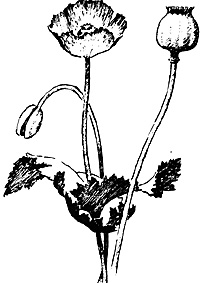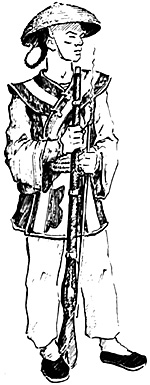 The Opium War was the first war fought between
China and a European nation. It should be called the Trade
War, since the real cause of the war was over the ability of
England to continue her trade with China. Opium was just the
fuse that finally led to the explosion.
The Opium War was the first war fought between
China and a European nation. It should be called the Trade
War, since the real cause of the war was over the ability of
England to continue her trade with China. Opium was just the
fuse that finally led to the explosion.
The industrial revolution forced Western European nations, especially England, to seek out overseas markets for their ever-growing commercial output. One place with enormous trading potential was China. English merchants were delighted at the prospect of such a populous and untouched commercial opportunity.
China during the 18th Century was a xenophobic empire, and like Japan, did not need or desire foreign trade. She had a self-sufficient agrarian economy. The Chinese also looked upon themselves is inhabitants of the 'Middle Kingdom", regarded all foreigners as barbarians, and shunned all dealings with them. The trade was a privilege that was bestowed on the foreigners as a gesture of generosity. Such trade was only permitted in the port of Canton (see map 1) because the Emperor did not want the presence of foreigners to corrupt Chinese society.
Given the mentality of both parties, Anglo-Chinese commerce did not start on a healthy footing. To sake matters worse, the most profitable and numerous commodity to be sold in China was opium.
The majority of the opium was grown in India and then shipped to Canton. For over 100 years, opium was considered a fashionable recreation for the Chinese upper class. Between 1729 and 1837 the amount of opium imported into China increased from 14,000 kg. to 2,400,000 kg. The price was about five ounces of silver for one kilo of opium. This enormous fortune enriched many British and American opium traders.
In 1838 many influential Chinese realized that opium was draining the Chinese economy and endangering Chinese lives. They prompted Emperor Tao-kuang to hold a special audience to discuss the opium issue. At the end, the Emperor adopted the drastic measures of outlawing the sale, import and use of opium. The Emperor sent a special commissioner to Canton to carry out the Imperial edict. This representative was Lin Tse-Hsu, the governor of Hunan and Canton, who was also an ardent anti-opiumist.
Commissioner Lin arrived in Canton on March 10, 1839, determined to enforce the anti-opium law with an iron fist. On March 18, he formally forbade all sales of opium; futhermore, all supplies of the drug were to be handed over without compensation. Any violation was punishable by death. The merchants were given three days to comply.
The merchants formed a special committee to review all the alternatives. They proposed to Lin that they be given extra time to reach a reasonable compromise. The proposal was rejected. On the 24th, the foreign merchants woke up and found all of their Chinese servants gone, and that they were confined to the 'factory' (foreign trading house) by Chinese soldiers and war junks.
 Siege of the Factories
Siege of the Factories
Thus began the 'siege of the factories' which incensed the western world. Food had to be smuggled in. The English commissioner of trade, Charles Elliot, arrived in Canton from Macao to salvage the situation. After days of bargaining, he agreed to hand over 20,000 chests of opium on condition that, 1) the merchants should be compensated, and 2) any violator was entitled to a fair trial.
Lin refused the English proposal, and Elliot had no choice but to evacuate the factories and retreat to Macao. Tensions might have cooled down but for another explosive incident, the death of Lin Wei-shi.
On 7 July, a group of British and American sailors were having a drinking bout in the village of Kowloon. They got into a drunken brawl with the owner after they learned that the saloon was out of wine. During the ensuing fight, a Chinese named Lin Wei-shi (no relation to commissioner Lin) was killed.
After hearing of the incident, Commissioner Lin sent a request to Elliot demanding the arrest of the offender. Elliot refused Lin's request on the grounds that the defendant was not guaranteed a fair trial, for the Chinese judicial system still relied on torture to obtain information.
Elliot decided to hold a trial of his own according to an Act of Parliament passed in 1833, which allowed the ranking diplomat the right to try British subjects in a foreign land. The trial took place on board a British ship on August 12. It was a trial by jury, with Elliot as the judge. On the grounds of insufficient evidence to determine the identity of the killer, five seamen who participated in the riot were sentenced to fines and a period of imprisonsent in the United Kingdom.
The Chinese were incensed at such a light sentence. They believed that the British were deliberately sheltering the offender. Commissioner Lin renewed his demand for the surrender of the murderer, and in the meantime, the whole British community would be punished for the gross injustice.
The Opium War Part 1
- Introduction
The Opening Shot
The First Expedition
On to the Peiho
Battle of the Bogue
The Ransom of Canton
Back to Table of Contents -- Savage and Soldier Vol. XIX No. 3
Back to Savage and Soldier List of Issues
Back to MagWeb Magazine List
© Copyright 2004 by Milton Soong.
This article appears in MagWeb (Magazine Web) on the Internet World Wide Web.
Other articles from military history and related magazines are available at http://www.magweb.com